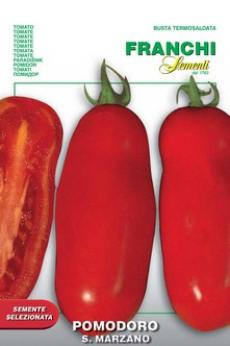
Tomato Pomodoro San Marzano Arriving Early February
Tomato Pomodoro San Marzano 2 is an Indeterminate Mid-Late 70 day tomato. Indeterminate, 82 days. Large plants with good disease resistance. Plum-shaped fruits are 5-6 ounces, with thin skin and very meaty flesh A fabulous producer of meaty dry tomatoes with thin skin and few seeds. San Marzano produces 2 1/2 - 3 ounce tomatoes. San Marzano is traditionally renowned in Italy as one of the best paste cooking tomatoes. It's a vigorous bush type plant. You can stake or cage this variety. If staking space 18" apart. If caging or leaving to sprawl, space 24" apart. 1 gram packet, approx. 250 seeds.
As explained by Paolo Arrigo, Franci Agent in the UK: The San Marzano may be the most famous tomato variety on the planet, thanks to its long history of cultivation around Naples and its use in sauces, Margherita pizza, and the traditional Neapolitan ragu (meat sauce). It is widely considered to be the best flavored tomato for sauce. Despite its immense popularity, San Marzano tomato has been added to the Slow Food Ark of Taste, which represents varieties in danger of extinction. The reason it has been listed is that during the past 20 years, commercial farmers have switched from the delicate San Marzano to new hybrids that can withstand mechanical production. The decline in large-scale production has reduced demand from farmers who grow the seeds. But if home gardeners continue to request San Marzano, its future is more secure. Fortunately, the demand for San Marzano is very strong among gardeners who value flavor above all else. Tomato lovers are grateful to Franchi Sementi for supplying top-quality seeds with excellent germination.
Here is additional information about San Marzano tomatoes from the Slow Food Ark of Taste listing as mentioned by Paolo Arrigo:
Getting into a field of ripe San Marzano tomatoes is a unique experience: you are stunned by the fragrances of freshly cut grass and spices emanated by this tomato also when it is still green and persistent even in the canned product. All aromas reminding of the past, when salads tasted of tomato and sun and did not look like alien imperishable, odourless and flavourless objects. Up to twenty years ago, the very fertile territory around Naples and the sarnese-nocerino countryside in the province of Salerno, particularly suitable for vegetable growing, was mainly farmed with San Marzano tomatoes, a very delicate variety, with a thin skin, which keeps well also after being preserved, but which needs to be handled with care. However, due to diseases and low competitiveness in terms of cultivation costs, more productive hybrids became widespread, as more resistant to diseases and more suitable for mechanized work, but with poorer quality and organoleptic properties. The canning companies producing peeled tomatoes started purchasing these hybrids, thus endangering indigenous San Marzano.San Marzano tomatoes are grown like vines and are harvested seven, eight times or more from July to September, only when perfectly ripe and after sunset. After picking them up, the tomatoes are rinsed with water and put in the cans, then cooked for 13 minutes. Nothing else is needed: no additives, no preservatives. It will keep well for at least one year. The several small artisan firms, mainly employing women, peel the tomatoes. But the real personality of San Marzano is seen in the plate: the sauce made with these tomatoes literally sticks onto pasta and does not release any acidity.The San Marzano tomato is inextricably linked to Neapolitan pizza (Margherita), and is also an ingredient in traditional Neapolitan ragù (meat sauce).
